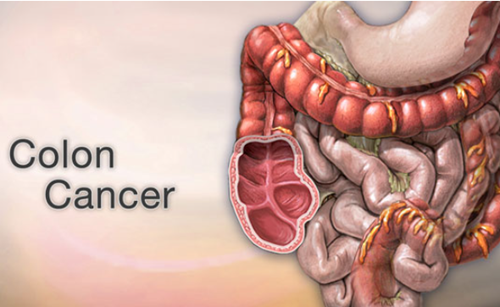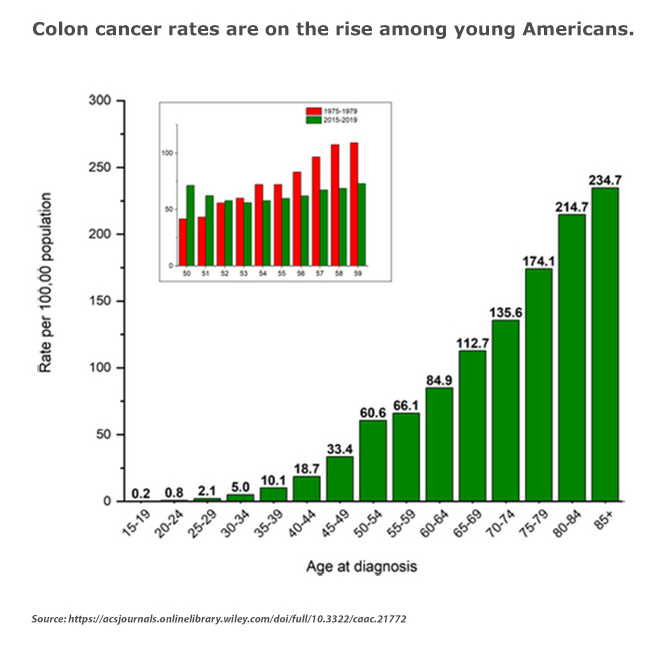The American Cancer Society recently released its Cancer Statistics 2024 report showing that while overall US cancer deaths continue to decline, some specific cancers like colorectal cancer have rapidly shifted, mortality patterns in adults younger than 50. In the late 1990s, colorectal cancer was the 4th leading cause of cancer-related death for people younger than 50. Now it’s the leading cause of cancer in men under 50, the 2nd leading cause in women and the 2nd leading cause of cancer-related deaths worldwide. The cancer trend is particularly pronounced in developed regions, such as North America, Australia and Western Europe.

Yale Medicine doctor warns those as young as 20 should be aware of cancer warning signs. The increase in cancers among younger people is still a bit of a medical mystery. It’s urgent that we better understand these changes in death rates, as well as related changes in cancer diagnoses. Most people in their 20s, 30s or 40s don’t think about being diagnosed with colorectal cancer. The truth is that colorectal cancer has been on the rise in young adults for years. Yale Medical surgeons urge those younger than 45 to talk to their doctors about any suspicious symptoms, such as frequent diarrhea or constipation, stomach pain, cramps, and/or bloating, rectal bleeding, bloody stool, fatigue, unexplained weight loss or continued feeling as though the bowels are not empty.
About 15 years ago, Yale Medicine surgeon Vikram Reddy, MD, PhD, conducted one of the first studies identifying the rising incidence of colorectal cancer among young people. “We’re still seeing the trend, so it wasn’t temporary,” says Dr. Reddy. In a single week the practice reported seven patients between 18 and 35 years old, diagnosed with rectal cancer. Even though if caught early, colorectal cancer is often highly treatable, the diagnosis can still be a significant health challenge for Gen Z, Millennials, and Gen X. A cancer diagnosis can interrupt careers, impact personal finances and force unexpected critical decisions such as preserving sperm or eggs in case treatment impacts fertility.
Why the Uptick?
Researches are still not sure why colorectal cancer numbers are rising in young people.. “Increasing colorectal cancer incidence in people born after the 1950s for reasons that are currently under investigation by many researchers but may include increased obesity, changes in diet and/or the gut microbiome including highly processed food consumption, a more sedentary lifestyle, overuse of antibiotics, and even gut exposure to microplastics, etc.,” Siegal told Medical News Today.
A family history of colorectal cancer, polyps, and inflammatory bowel disease are also risk factors. Up to one third of those diagnosed with cancer before age 50 have a family history or genetic predisposition. Those with these pre-dispositions should begin screening at 45 years of age.

Between the 1960s to early 2010s, alcohol consumption increased in many countries. A recent study found moderate alcohol consumption increased the risk of cancer in women. "We're finding that probably anywhere between 5% to 10% of all cancers worldwide are due to alcohol use," Dr. Suneel Kamath, a GI clinical oncologist at Cleveland Clinic Cancer Center, told "Good Morning America". “The rise in colorectal cancer in people under 50 is the same in men and women, strongly suggesting the cause is not hormonal or endogenous, but due to external environmental or behavioral changes,” she added.
Dr. Anton Bilchik, surgical oncologist, Chief of Medicine, and director of the Gastrointestinal and Hepatobiliary Program at Saint John’s Cancer Institute in Santa Monica, CA, who was not involved in this study, said another theory for this rise in colon cancer deaths might be inflammation. “Inflammation has been shown to result in an increase in cardiovascular disease, as well as cancer,” Dr. Bilchik told MNT. “The concern is that a lot of this starts at a very young age and that education needs to start really at preschool in terms of what kids are eating and the importance of not living a sedentary lifestyle,” he added.
How can I help protect myself from colon cancer?
When it comes to protecting yourself from colon cancer by actively discuss family history with your primary care physician, don’t ignore changes in bowel habits or anal bleeding and start getting screened at age 45. Dr. Bilchik provided these basic tips for defending against colorectal cancer:
• Exercise at least five days a week for 30 to 40 minutes at a time
• Avoid or stop smoking
• Avoid processed food as much as possible
• Limit red meat, as previous research Trusted Source shows that too much red meat is associated with colon cancer
• Don’t ignore symptoms such as rectal bleeding, stomach pain, and unexplained weight loss
• When you go to a grocery store, shop the outside, where fruits, vegetables, and healthier foods are located, rather than the inside, where a lot of processed foods can be found
Probiotics have been shown to have beneficial effects on human health, including antibacterial activity against intestinal pathogens, regulating blood cholesterol levels, reducing the incidence of colitis and inflammation, regulating the immune system, and preventing colon cancer .
Don’t hesitate, call now! Atlanta Colonic & Massage offers a variety of wellness programs to fit your needs. Schedule your wellness program and feel the difference.
 Add Row
Add Row  Add
Add 


Write A Comment